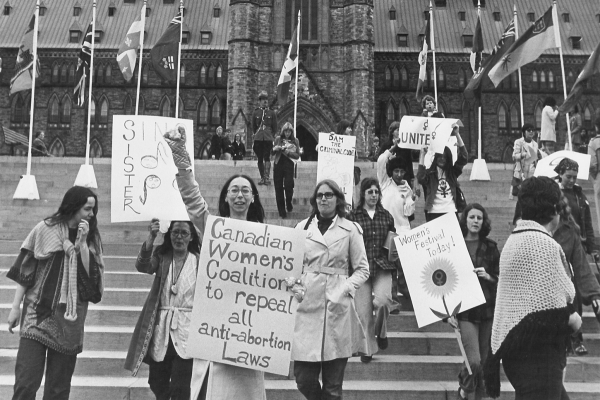Once more around the Bloc
tactics, democracy, and mass politics
Our democratic freedoms hang by a narrow thread, and a police state is always near at hand — that is one of the lessons of the G20 debacle that unfolded in Toronto on June 26 and 27. The federal government spent a billion dollars on security and deployed 19,500 police on the streets of downtown Toronto. Activist groups were infiltrated, and organizers were targeted for preemptive arrest. Despite the overwhelming police presence, a small number of smashed windows and burning police cars shown on constant loop by TV news were enough to persuade much of the population that police violence and the arbitrary arrest of more than 1000 people were justified.
The responsibility for this unprecedented repression lies squarely with governments and police forces. All detainees must be released and trumped up charges against activist organizers must be dropped. Those who made the decisions to suspend civil liberties must be discovered and held to account. But they did not act without a pretext. That pretext was provided by a small number of people who employed “black bloc” tactics, masking up and smashing and burning things before disappearing into crowds of peaceful protesters.
Some might argue that the tactics were a success, provoking awareness of the violent authoritarianism inherent in the capitalist state. Such claims reveal the privileged perspective of those who make them. Who, exactly, was not aware of the state’s violent authoritarianism? Young black men in the suburbs? Indigenous people? Immigrants? The poor? Those who were shocked at the police violence come largely from the privileged classes.
What has been mobilized in response is not a challenge to the system, but a defense of liberal democracy. Movements building a base for more fundamental critiques, like the Indigenous justice or environmental justice movements, have now been overshadowed by the movement to defend basic democratic freedoms. Headlines are about protest and policing, not about the sweeping cuts to social programs that will come out of the G20’s austerity agenda.
This brings us to the first problem with black bloc tactics: they do not work. There is no example of the successful use of “the propaganda of the deed” in liberal democracies. These tactics legitimate authoritarianism, which is fought by defending liberal rights. Black bloc, and similar tactics, disorganize and divide social movements and discredit radical ideas. They mire activists in legal process and court support. They serve the interests of the state, which is why liberal democracies have continually employed infiltrators and agents provocateurs to promote them within movements.
Black bloc tactics are also deeply undemocratic. Socialists and anarchists alike believe that those who are affected by a decision should have a say in making it. Black bloc tactics have a profound impact on the movements and place an additional burden of repression on those who are already most oppressed. Yet the decision to use these tactics is made by a small number of self-styled radicals without consent from the vast majority who will be affected by them. The unaccountable use of these tactics is just as authoritarian and colonial as the system they are supposed to fight.
Far from practicing accountability, those who favour these tactics have campaigned to impose on the movements the doctrine of “diversity of tactics,” which enjoins that no one shall be publicly held to account for the tactics they choose. This doctrine abandons mass organizing, collective strategy, and democracy for a kind of ultra-vanguardism in which those who use the most extreme tactics get to impose the consequences of their choice on the majority without consultation. Underpinning “diversity of tactics” is not an alternative vision of democratic collectivity, but a supremely entitled liberal individualism. That has no place in our movements.
Like police repression, the black bloc and “diversity of tactics” require nourishment to thrive. During the G20, the labour movement and NGOs provided this nourishment. Early on in the organizing, their representatives weakly acceded to the demands of “radicals” on diversity of tactics, which gave the black bloc the space they needed. The unions and NGOs were also incapable of providing ideological leadership or focus in the events they organized. The major mobilization of June 26, which saw tens of thousands on the street, was themed People First and its slogan was “We deserve better.” It had no clear demands or strategic goals, and no vision that inspired.
Like the black bloc actions, the labour march, which brought out 20,000 people, was pro forma. While vibrant, unlike the black bloc actions, it lacked any tone of militancy. Organizers caved to police demands not to approach the security fence surrounding the G20 conference centre. With tens of thousands of people on the streets, labour leaders chose a symbolic demonstration of their weakness, turning away from the fence and circling back to their starting point. This was the context that gave power to calls for militant breakaway actions to go to the fence.
Some have used the opportunity of the G20 fallout to argue that protests don’t make a difference. Subsequent mobilizations defending civil rights have certainly put the lie to that claim. Certainly, weak protests and weak leadership don’t make a difference. While the black bloc eschews mass organization and accountability, organized labour is abdicating any leadership role in political struggle. That will only change by building mass organizations inside and outside the unions that can exert pressure on them and provide ideological leadership. Only when we practice political leadership, accountability to the base, and an orientation to mass politics can our movements for radical change be strong.
entry image used under creative commons licencing original author can be found at www.flickr.com/photos/salty_soul/










